2013
(Vatican Radio) Pope Francis on Thursday paid his first official visit to Italy’s head of state, Giorgio Napolitano, at Rome’s Quirinale Palace where he also met leading members of the Italian government. In his address to President Napolitano, the Pope touched on the social and economic problems afflicting Italy such as unemployment and urged the state institutions to do their utmost to support the family. He also said he would like to knock at the door of every home in Italy to offer the healing words of the gospel.
Pope Francis visited President Napolitano at Rome’s Quirinale, a Renaissance Palace, which up until 1870 had been a residency of the papacy for many centuries. His visit to the Italian head of State came 5 months after President Napolitano was received in audience by him at the Vatican.
In his address to Napolitano, Pope Francis said his visit confirmed the excellent relations that exist between Italy and the Holy See and recalled his predecessor’s visit to the Quirinale Palace in 2008. "Ideally," said the Pope, "I would wish to knock at the door of every inhabitant of Italy and offer to everybody the healing and ever new words of the Gospel."
Pope Francis said in their separate roles both Church and State share many common concerns such as the economic crisis and the resulting lack of jobs which he described as "one of its most painful consequences." He urged everyone to redouble their efforts to alleviate the consequences of this.
"The Church’s main task," the Pope continued, "is to bear witness to God’s mercy and to encourage a generous response of solidarity." In this way, we can help build a more just and humane society and promote a sustainable and healthy development.
Recalling his pastoral visits to the islands of Lampedusa and Sardinia and to the city of Assisi, the Pope said that in all these places he witnessed and touched with his hands "the wounds" that afflict so many suffering people.
Turning to the family, the Pope urged everyone to support the family unit, saying it needs to be "appreciated, valued and protected" so it can carry out its vital mission in society. He ended by expressing his hope that "Italy can recover its creativity and harmony" so it can promote the well-being and dignity of every human person.
In his own address, President Napolitano praised Pope Francis for his desire to carry out "a dialogue with everyone, even opponents and those who are most distant," saying the spirit of the Second Vatican Council vibrates in his words. Napolitano also spoke of the need to counter a spreading egoism and social insensitivity and said politics need to be freed from the plague of corruption and the promotion of personal interests.
SHARED FROM RADIO VATICANA
Pope Francis visited President Napolitano at Rome’s Quirinale, a Renaissance Palace, which up until 1870 had been a residency of the papacy for many centuries. His visit to the Italian head of State came 5 months after President Napolitano was received in audience by him at the Vatican.
In his address to Napolitano, Pope Francis said his visit confirmed the excellent relations that exist between Italy and the Holy See and recalled his predecessor’s visit to the Quirinale Palace in 2008. "Ideally," said the Pope, "I would wish to knock at the door of every inhabitant of Italy and offer to everybody the healing and ever new words of the Gospel."
Pope Francis said in their separate roles both Church and State share many common concerns such as the economic crisis and the resulting lack of jobs which he described as "one of its most painful consequences." He urged everyone to redouble their efforts to alleviate the consequences of this.
"The Church’s main task," the Pope continued, "is to bear witness to God’s mercy and to encourage a generous response of solidarity." In this way, we can help build a more just and humane society and promote a sustainable and healthy development.
Recalling his pastoral visits to the islands of Lampedusa and Sardinia and to the city of Assisi, the Pope said that in all these places he witnessed and touched with his hands "the wounds" that afflict so many suffering people.
Turning to the family, the Pope urged everyone to support the family unit, saying it needs to be "appreciated, valued and protected" so it can carry out its vital mission in society. He ended by expressing his hope that "Italy can recover its creativity and harmony" so it can promote the well-being and dignity of every human person.
In his own address, President Napolitano praised Pope Francis for his desire to carry out "a dialogue with everyone, even opponents and those who are most distant," saying the spirit of the Second Vatican Council vibrates in his words. Napolitano also spoke of the need to counter a spreading egoism and social insensitivity and said politics need to be freed from the plague of corruption and the promotion of personal interests.
SHARED FROM RADIO VATICANA
TYPHOON DEATH TOLL REACHES 4460 IN PHILIPPINES
ARCHDIOCESE OF SYDNEY RELEASE
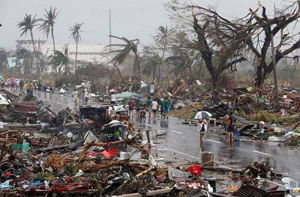
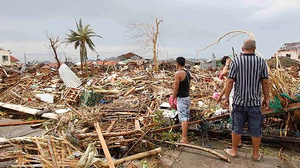
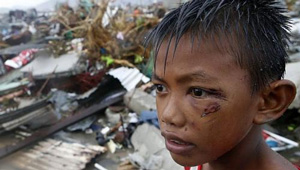
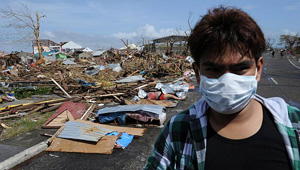
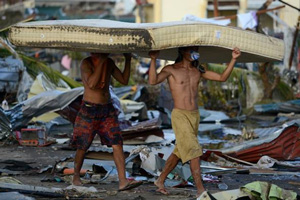
Catholic Communications, Sydney Archdiocese,
15 Nov 2013
15 Nov 2013

With many roads blocked or damaged aid workers are struggling to deliver food, water and medicines
The United Nations has issued an update of the number of those killed by Typhoon Haiyan to 4460 people. However officials believe this will inevitably rise as damage is hampering rescue efforts.
Emergency rescue teams and international aid groups are still desperately trying to reach devastated villages and towns which still remain cut off seven days after the typhoon struck.
The UN's Office for the Coordination of Humanitarian Affairs has also announced that 900,000 have been displaced with as many as 12 million in the Philippines affected in some way by one of the most powerful storms to make landfall.
Medical teams, aid workers and soldiers are crammed on to flights heading to landing strips that are cleared and close to devastated areas. Supplies are trickling in because roads are either strewn with debris or covered in fallen trees or have even collapsed.
They arrive with food, medical supplies and body bags and ferry away the dead.

Some areas have been totally wiped out. Officials expect the death toll to rise
Tens of thousands of people are living in the open or severely damaged buildings, exposed to rain and wind. Many are injured, all in desperate need of food, water and sanitation.
Typhoon Haiyan struck the Philippines one week ago with wind gusts of more than 350kph and storm surges two storeys high.
"The havoc and widespread destruction is on the scale of 2004's tsunami," says Caritas Australia's Humanitarian Emergencies Co-ordinator, Richard Forsythe.
"The sheer size of Typhoon Haiyan is difficult to grasp," he says explaining that not only did the super-storm bring gusts with a force that ripped off roofs, tossed cars and fishing boats like confetti and tore babies and children from their parents arms but it had a massive storm front more than 800 kilometres in diameter and an eye that was 15 kilometres wide.

No home, no food or water-struggling to survive
Within hours of the storm's violent assault on the Philippines, Caritas Australia and other members of Caritas Internationalis, the aid and development arm of the Catholic Church had teams on the ground and were helping to provide food, clean drinking water and shelter to traumatised men, women and children in some of the hardest hit areas such as Leyte, Tacloban ,Palo and Samar.
Within two days, Caritas had freighted in 20,000 tarpaulins for emergency use along with 1 million water purification tablets to help as many as 16,000 families. A further 18,000 emergency shelter supply kids, 5000 water, sanitation and hygiene kits and 5000 non-food item kits had also been delivered.
Caritas Response teams immediately travelled to some of the hardest-hit regions in areas such as Leyte and North Samar Island, as well as Panay Island to assess damage and exactly what those traumatised by the catastrophic typhoon needed, not only in the immediate term but over the next five years or more.
"Recovering and rebuilding from a natural disaster on this scale will take at least five years and that is what we are looking at and planning for," Richard Forsythe says adding that a great deal of money will be needed to help victims of the ferocious force of Typhoon Haiyan rebuild and recover.

Infection and disease is now a serious concern
One week on and countless cities, towns and villages across the Philippines still have no electricity. Communications remain down and in those areas impacted by the super storm, not many houses remain. Few shops or businesses survived and none are open and for survivors struggling to cope, there is little food, no medicines and infrastructure across entire regions has been almost totally destroyed.
Safe drinking water is at a premium. But people are so desperate they have begun drinking water from pools among the rubble and rivers that are almost certainly contaminated. In the heat and humidity, the thousands of bodies are still lying amidst the rubble of devastated cities and towns and pose new dangers with an increased risk of infection and deadly diseases.
Hunger and thirst seven days after the typhoon hit have driven the starving to resort to looting and scavenging for any food they can find.
Two days ago eight people were crushed to death after a wall collapsed on top of them during a raid on stockpiles of rice in a government warehouse in the town of Alangalang.

Saving a bed-but not home in which to put it
Throughout the week teams of doctors and nurses from Australia and other nations have flown to the Philippines with portable hospitals and a cargo of medicine. Australia has also pledged $10 million to help recovery in the stricken country. In addition the US has sent in 2000 US Marines and massive cargoes of medicines, food and supplies.
But the widespread scale of the damage and inaccessibility of so many of those affected by the Typhoon Haiyan is slowing down the delivery of this urgently needed aid.
Today the UN warned that fuel in the devastated city of Tacloban, once a thriving metropolis of 200,000 will run out within the next few days. The Mayor of Tacloban also revealed that workers have the terrible choice of having to choose between using their trucks to distribute food to the desperately hungry or to collect the thousands of bodies.
Caritas Australia has committed $1.5 million to support the international Caritas network's appeal to help communities impacted by what is now being considered as one of the worst humanitarian crises.
To assist this mammoth effort Caritas Australia has also an appeal for Typhoon Haiyan-Philippines. To donate log on tohttp://www.caritas.org.au/
POPE FRANCIS "BUT, LOOK, OUR LADY IS THE MOTHER OF EVERYONE!"
The Pope began his homily by commenting on the first reading from the Book of Wisdom, which describes “the state of the soul of the spiritual man and woman”, of true Christians, who live “in the wisdom of the Holy Spirit. And this wisdom carries them forward with this intelligent, holy, single, manifold and subtle spirit”.
“This is journeying in life with this spirit: the spirit of God, which helps us to judge, to make decisions according to the heart of God. And this spirit gives us peace, always! It is the spirit of peace, the spirit of love, the spirit of fraternity. And holiness is exactly this. That which God asked of Abraham—‘Walk in my presence and be irreproachable’—is this: this peace. To follow the movement of the Spirit of God and of this wisdom. And the man and woman who walk this path, we can say they are wise men and women… because they follow the movement of God’s patience.”
In the Gospel, the Pope underlined, “we find ourselves before another spirit, contrary to the wisdom of God: the spirit of curiosity”.
“And when we want to be the masters of the projects of God, of the future, of things, to know everything, to have everything in hand… the Pharisees asked Jesus, ‘When will the Kingdom of God come?’ Curious! They wanted to know the date, the day… The spirit of curiosity distances us from the Spirit of wisdom because all that interests us is the details, the news, the little stories of the day. Oh, how will this come about? It is the how: it is the spirit of the how! And the spirit of curiosity is not a good spirit. It is the spirit of dispersion, of distancing oneself from God, the spirit of talking too much. And Jesus also tells us something interesting: this spirit of curiosity, which is worldly, leads us to confusion.”
Curiosity, the Pope continued, impels us to want to feel that the Lord is here or rather there, or leads us to say: “But I know a visionary, who receives letters from Our Lady, messages from Our Lady”. And the Pope commented: “But, look, Our Lady is the Mother of everyone! And she loves all of us. She is not a postmaster, sending messages every day.”
Such responses to these situations, he affirmed, “distance us from the Gospel, from the Holy Spirit, from peace and wisdom, from the glory of God, from the beauty of God.”
“Jesus says that the Kingdom of God does not come in a way that attracts attention: it comes by wisdom.”
“ ‘The Kingdom of God is among you,’ said Jesus, and it is this action of the Holy Spirit, which gives us wisdom and peace. The Kingdom of God does not come in (a state of) confusion, just as God did not speak to the prophet Elijah in the wind, in the storm (but) he spoke in the soft breeze, the breeze of wisdom.”
“Saint Teresa of the Child Jesus would say that she had always to stop herself before the spirit of curiosity," he said. "When she spoke with another sister and this sister was telling a story about the family, about people, sometimes the subject would change, and she would want to know the end of the story. But she felt that this was not the spirit of God, because it was a spirit of dispersion, of curiosity.
“The Kingdom of God is among us: do not seek strange things, do not seek novelties with this worldly curiosity. Let us allow the Spirit to lead us forward in that wisdom, which is like a soft breeze," he said. "This is the Spirit of the Kingdom of God, of which Jesus speaks. So be it.”
SHARED FROM RADIO VATICANA
NUN WINS BLOGGER OF THE YEAR AWARD IN EUROPE
|
IND. CATHOLIC NEWS REPORT: A blog, created and written by a Benedictine nun in Herefordshire, was one of 15 winners in this year’s annual Christian New Media Awards, presented in London last weekend by the Premier group’s New Media Centre of Excellence.
Sister Catherine Wybourne from Holy Trinity Monastery at Howton Grove Priory, who was nominated by a third party, received the ‘Best Blogger of the Year’ award of a new iPad air for her work on the www.ibenedictines.org website.
Hosted by Premier Christian Radio presenter Maria Rodrigues and writer and broadcaster Sheridan Voysey, the awards were open to bloggers, churches, charities and businesses who entered their websites in the Seventh annual competition, staged in conjunction with the Christian New Media Conference.
Kevin Bennett, Director of New Media, said: “Yet again we are truly encouraged by the creativity, passion and skills demonstrated by the Christian community online. These awards aim to encourage and celebrate those who are pushing boundaries to share the message of Christ online with the aid of 21st century technology and I commend the finalists to you.”
This year’s competition saw 15 awards in three individual categories – Blogs, Websites, and New Media – including ‘Young Blogger of the Year’, ‘Most Inspiring Leadership Blog’, ‘Up & Coming Award’, ‘Multi-Author Blog of the Year’, ‘Best Christian Organisation Website’, ‘Most Engaging Small Church Website’, ‘Most Engaging Large Church Website’, ‘Best New or Re-designed Web Site’, ‘Accessibility Award’, ‘Innovative Use of New Media in Outreach’, ‘Christian Mobile/Tablet app of the Year’, ‘Tweeter of the Year’, ‘Most Creative Use of Social Media’, and ‘People’s Choice Award’.
A £1,000 cheque for the ‘Most Engaging Small Church Website’ went to Catherine Hellings of the Hope Church, Islington.
Winner of the ‘Most Creative Use of Social Media’ went to Spurgeons for their ‘Every 22 Minutes’ initiative which responds to the fact that, every 22 minutes, a child under 16 in the UK loses a parent.
Fiona Furman, who directs the campaign, explained that the organisation has almost 100 services operating across England supporting children following bereavement or being separated from their parents.
“Jesus himself told us that those who mourn will be comforted,” she said. ”We are so delighted that our campaign has been recognised by these awards, especially for these young people, so we might all better understand their grief”.
Their website can be found at www.every22minutes.org.uk
For a full list of Winners and finalists, visit www.nmce.org.uk/winners.
SHARED FROM IND. CATHOLIC NEWS
TODAY'S MASS ONLINE : FRI. NOV. 15, 2013
Friday of the Thirty-second Week in Ordinary Time
Lectionary: 495
Reading 1 WIS 13:1-9
All men were by nature foolish who were in ignorance of God,
and who from the good things seen did not succeed in knowing him who is,
and from studying the works did not discern the artisan;
But either fire, or wind, or the swift air,
or the circuit of the stars, or the mighty water,
or the luminaries of heaven, the governors of the world, they considered gods.
Now if out of joy in their beauty they thought them gods,
let them know how far more excellent is the Lord than these;
for the original source of beauty fashioned them.
Or if they were struck by their might and energy,
let them from these things realize how much more powerful is he who made them.
For from the greatness and the beauty of created things
their original author, by analogy, is seen.
But yet, for these the blame is less;
For they indeed have gone astray perhaps,
though they seek God and wish to find him.
For they search busily among his works,
but are distracted by what they see, because the things seen are fair.
But again, not even these are pardonable.
For if they so far succeeded in knowledge
that they could speculate about the world,
how did they not more quickly find its Lord?
and who from the good things seen did not succeed in knowing him who is,
and from studying the works did not discern the artisan;
But either fire, or wind, or the swift air,
or the circuit of the stars, or the mighty water,
or the luminaries of heaven, the governors of the world, they considered gods.
Now if out of joy in their beauty they thought them gods,
let them know how far more excellent is the Lord than these;
for the original source of beauty fashioned them.
Or if they were struck by their might and energy,
let them from these things realize how much more powerful is he who made them.
For from the greatness and the beauty of created things
their original author, by analogy, is seen.
But yet, for these the blame is less;
For they indeed have gone astray perhaps,
though they seek God and wish to find him.
For they search busily among his works,
but are distracted by what they see, because the things seen are fair.
But again, not even these are pardonable.
For if they so far succeeded in knowledge
that they could speculate about the world,
how did they not more quickly find its Lord?
Responsorial Psalm PS 19:2-3, 4-5AB
R. (2a) The heavens proclaim the glory of God.
The heavens declare the glory of God,
and the firmament proclaims his handiwork.
Day pours out the word to day,
and night to night imparts knowledge.
R. The heavens proclaim the glory of God.
Not a word nor a discourse
whose voice is not heard;
Through all the earth their voice resounds,
and to the ends of the world, their message.
R. The heavens proclaim the glory of God.
The heavens declare the glory of God,
and the firmament proclaims his handiwork.
Day pours out the word to day,
and night to night imparts knowledge.
R. The heavens proclaim the glory of God.
Not a word nor a discourse
whose voice is not heard;
Through all the earth their voice resounds,
and to the ends of the world, their message.
R. The heavens proclaim the glory of God.
Gospel LK 17:26-37
Jesus said to his disciples:
“As it was in the days of Noah,
so it will be in the days of the Son of Man;
they were eating and drinking,
marrying and giving in marriage up to the day
that Noah entered the ark,
and the flood came and destroyed them all.
Similarly, as it was in the days of Lot:
they were eating, drinking, buying,
selling, planting, building;
on the day when Lot left Sodom,
fire and brimstone rained from the sky to destroy them all.
So it will be on the day the Son of Man is revealed.
On that day, someone who is on the housetop
and whose belongings are in the house
must not go down to get them,
and likewise one in the field
must not return to what was left behind.
Remember the wife of Lot.
Whoever seeks to preserve his life will lose it,
but whoever loses it will save it.
I tell you, on that night there will be two people in one bed;
one will be taken, the other left.
And there will be two women grinding meal together;
one will be taken, the other left.”
They said to him in reply, “Where, Lord?”
He said to them, “Where the body is,
there also the vultures will gather.”
“As it was in the days of Noah,
so it will be in the days of the Son of Man;
they were eating and drinking,
marrying and giving in marriage up to the day
that Noah entered the ark,
and the flood came and destroyed them all.
Similarly, as it was in the days of Lot:
they were eating, drinking, buying,
selling, planting, building;
on the day when Lot left Sodom,
fire and brimstone rained from the sky to destroy them all.
So it will be on the day the Son of Man is revealed.
On that day, someone who is on the housetop
and whose belongings are in the house
must not go down to get them,
and likewise one in the field
must not return to what was left behind.
Remember the wife of Lot.
Whoever seeks to preserve his life will lose it,
but whoever loses it will save it.
I tell you, on that night there will be two people in one bed;
one will be taken, the other left.
And there will be two women grinding meal together;
one will be taken, the other left.”
They said to him in reply, “Where, Lord?”
He said to them, “Where the body is,
there also the vultures will gather.”
TODAY'S SAINT: NOV. 15: ST. ALBERT THE GREAT
DOCTOR OF THE CHURCH
Feast: November 15
Information:
Feast Day:
November 15
Born:
1206, Lauingen, Bavaria
Died:
November 15, 1280, Cologne, Holy Roman Empire
Canonized:
1931 by Pius XI
Major Shrine:
St. Andreas in Cologne
Patron of:
medical technicians; natural sciences; philosophers; scientists; students
He was known as the "teacher of everything there is to know," was a scientist long before the age of science, was considered a wizard and magician in his own lifetime, and became the teacher and mentor of that other remarkable mind of his time, St. Thomas Aquinas.
St. Albert the Great was born in Lauingen on the Danube, near Ulm, Germany; his father was a military lord in the army of Emperor Frederick II. As a young man Albert studied at the University of Padua and there fell under the spell of Blessed Jordan of Saxony, the Dominican who made the rounds of the universities of Europe drawing the best young men of the universities into the Dominicans.
After several teaching assignments in his order, he came in 1241 to the University of Paris, where he lectured in theology. While teaching in Paris, he was assigned by his order in 1248 to set up a house of studies for the order in Cologne. In Paris, he had gathered around him a small band of budding theologians, the chief of whom was Thomas Aquinas, who accompanied him to Cologne and became his greatest pupil.
In 1260, he was appointed bishop of Regensberg; when he resigned after three years, he was called to be an adviser to the pope and was sent on several diplomatic missions. In his latter years, he resided in Cologne, took part in the Council of Lyons in 1274, and in his old age traveled to Paris to defend the teaching of his student Thomas Aquinas.
It was in Cologne that his reputation as a scientist grew. He carried on experiments in chemistry and physics in his makeshift laboratory and built up a collection of plants, insects, and chemical compounds that gave substance to his reputation. When Cologne decided to build a new cathedral, he was consulted about the design. He was friend and adviser to popes, bishops, kings, and statesmen and made his own unique contribution to the learning of his age.
He died a very old man in Cologne on November 15,1280, and is buried in St. Andrea's Church in that city. He was canonized and declared a Doctor of the Church in 1931 by Pope Pius XI. His writings are remarkable for their exact scientific knowledge, and for that reason he has been made the patron saint of scientists.
Thought for the Day: St. Albert the Great was convinced that all creation spoke of God and that the tiniest piece of scientific knowledge told us something about Him. Besides the Bible, God has given us the book of creation revealing something of His wisdom and power. In creation, Albert saw the hand of God.
From "The Catholic One Year Bible": Since we have a kingdom nothing can destroy, let us please God by serving him with thankful hearts, and with holy fear and awe. For our God is a consuming fire.—Hebrews 12:28-29
, 2013
FREE CATHOLIC MOVIES MOTHER TERESA IN THE NAME OF GOD'S POOR - 1997 DRAMA - PART 3
JCE News is showing - Mother Teresa: In the Name of God's Poor (1997)
This is the true story of Mother Teresa, beginning in Calcutta, India, where she starts her order to help the poorest of Gods poor.
Director:
Kevin Connor
Writers:
Jan Hartman (story), Dominique Lapierre (story),Stars:
Geraldine Chaplin, Keene Curtis, Helena Carroll
Agenzia Fides report - A French priest, Father Georges Vandenbeusch, 42, was kidnapped in Cameroon, yesterday, 13 November, around 11.30 pm local time, says to to Fides Agency Mgr. Henri Djonyang, Vicar General of the diocese of Maroua - Mokolo. The priest was taken while he was in the parish of Nguetchewe, about twenty kilometers from the border with Nigeria.
"The kidnappers spoke English, Houssa and Kanuri", said Mgr. Djonyang. It is suspected that the kidnappers come from Nigeria and are men of the Islamist sect Boko Haram.
"Fr. Vandenbeusch is a Fidei Donum priest of the Diocese of Nanterre, on the outskirts of Paris. He has been here for about three years and is primarily committed to giving shelter and support to the families of refugees from Nigeria", said the Vicar General. "We are in contact with local authorities but at the moment we have no further information", he concludes. (L.M.) (Agenzia Fides 14/11/2013)
"The kidnappers spoke English, Houssa and Kanuri", said Mgr. Djonyang. It is suspected that the kidnappers come from Nigeria and are men of the Islamist sect Boko Haram.
"Fr. Vandenbeusch is a Fidei Donum priest of the Diocese of Nanterre, on the outskirts of Paris. He has been here for about three years and is primarily committed to giving shelter and support to the families of refugees from Nigeria", said the Vicar General. "We are in contact with local authorities but at the moment we have no further information", he concludes. (L.M.) (Agenzia Fides 14/11/2013)
Subscribe to: Posts (Atom)


No comments:
Post a Comment